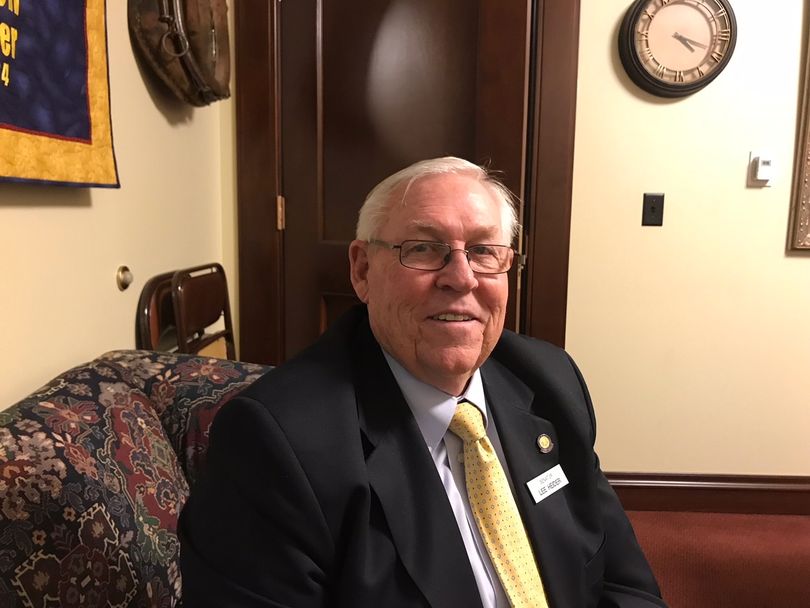Sen. Heider apologizes for improper closed-door meeting, says fate of CBD oil bill remains undecided

Senate Health & Welfare Chairman Lee Heider apologized today for violating Senate rules yesterday by convening an impromptu – and likely illegal – closed meeting of his Senate committee. “The chair acknowledges violation of Senate Rule 20, in that an unnoticed and unapproved executive session occurred,” Heider, R-Twin Falls, told his committee this afternoon. He then asked for unanimous consent to “set aside the vote on March 5, 2018 because it violated Senate Rule 20.”
That was the vote in which the committee decided to hold in committee HB 577, the House-passed bill to legalize marijuana-derived CBD oil in Idaho, killing it. “The chair announces that at this point in time, no committee decision has been made on HB 577,” Heider said. “It is worth noting that HB 577 could still be considered by the committee, and it is still subject to the procedure in Senate Rule 14(E), Calling for a Bill.”
That’s a rarely-successful procedure in which senators, on the floor of the Senate, call for a bill to emerge from a committee over its chairman’s opposition.
Yesterday, Sen. Tony Potts, R-Idaho Falls, made an unexpected motion to hold a hearing on HB 577 on the spot, though the measure wasn’t on the committee’s agenda. An angry Heider led his committee behind closed doors in his office, where shouting could be heard. Reporters were kept outside; one, Melissa Davlin of Idaho Public Television, knocked on the door and informed Heider he was violating the Idaho Open Meeting Law.
After six minutes, the committee reconvened in its regular hearing room and approved a substitute motion to hold the CBD oil bill in committee, but Heider said today that that wasn’t a valid vote.
Potts’ motion “kinda threw us off,” Heider said, “because he was not on the agenda. That’s also a violation. So it kinda threw me off a bit.”
Heider said he’d been spoken to by both Senate leadership and the Idaho Attorney General’s office. “That was not an appropriate thing to do,” he said of his actions a day earlier. “I apologize to the committee for any of us getting into trouble. … Sen. Potts kinda threw us into a tailspin.”
Asked the status of the CBD oil bill, Heider said, “I guess I’m still holding it. But the committee hasn’t voted to hold it. I don’t know if I’ll bring it out at some point.”
“The status is right now it’s in my drawer,” he said. “Believe me, I’m getting lots of emails about that.”
In the Idaho Legislature, a committee chair can unilaterally kill a bill by simply not scheduling a hearing on it. But that can be overridden by moves like calling the bill from the floor.
Heider said he’s holding the bill because lots of people want him to, including prosecutors, law enforcement, the governor’s office and the state Office of Drug Policy. “There’s a lot of people that are very unhappy that we’re moving forward with this bill,” he said. “Should the governor come and tell me he’s going to veto it if it comes out, which he has indicated he would, then I may let him take the heat.”
Heider said he hasn’t spoken with Gov. Butch Otter, who hinted at a “Capitol for a Day” session in eastern Idaho last week that if the bill passes, he might veto it again, as he did an earlier measure in 2015.
“I don’t want to be the bad guy – I’m not a bad person,” Heider said. “But I feel like it really is opening the door to marijuana in our state. We are the bastion of freedom from marijuana in our state, and I like living here.”
CBD oil is has only trace amounts of THC, the intoxicating ingredient in marijuana. Idaho currently is involved in a drug trial in which more than 30 Idaho children with intractable epilepsy are being treated with a commercial version of CBD oil called Epidiolex; success has been reported in reducing the children’s seizures.
Heider said Potts has apologized to him for being out of order. “Obviously I won’t be doing that in the future,” Heider said.
He said the statement he read in committee came straight from the Attorney General’s office. “They felt like that’s what I needed to do to apologize and to make things right.” He added, “I’m sorry for the confusion,” and noted that 24-hour advance notice of agenda items is “a very important part of what we do around here.”
“It just kinda caught me off guard,” Heider said. “Hopefully it won’t happen again.” He added, “This was my mistake. I hope it’s been rectified.”
